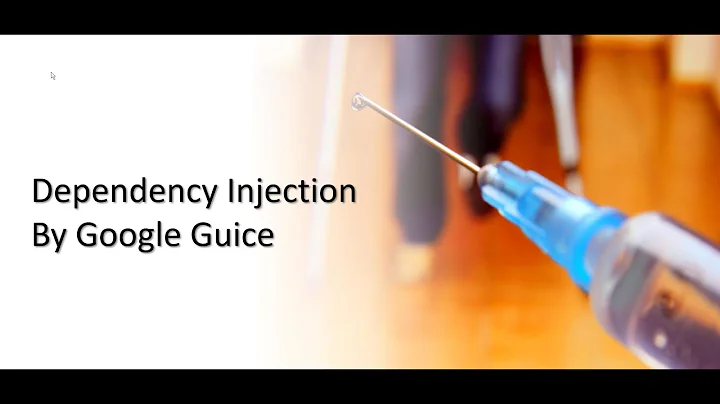Guice: is it possible to inject modules?
Solution 1
@Provides methods can take dependencies as parameters just like parameters to an @Inject annotated constructor or method:
@Provides Something provideSomething(Dependency d) {
return new Something(d); // or whatever
}
This is documented here, though perhaps it could be made to stand out more.
Solution 2
Using a provider or @Provides methods are great if you need a dependency to manually construct an object. However, what if you need something to help you decide how to configure the bindings themselves? It turns out you can use Guice to create (and configure) your module.
Here is a (contrived) example. First, the module we want to configure:
/**
* Creates a binding for a Set<String> which represents the food in a pantry.
*/
public class PantryModule extends AbstractModule {
private final boolean addCheese;
@Inject
public ConditionalModule(@Named("addCheese") boolean addCheese) {
this.addCheese = addCheese;
}
@Override
protected void configure() {
Multibinder<String> pantryBinder = Multibinder
.newSetBinder(binder(), String.class);
pantryBinder.addBinding().toInstance("milk");
if (addCheese) {
pantryBinder.addBinding().toInstance("cheese");
}
pantryBinder.addBinding().toInstance("bread");
}
}
The PantryModule expects a boolean value to be injected to decide whether or not it should include cheese in the pantry.
Next, we'll use Guice to configure the module:
// Here we use an anonymous class as the "configuring" module. In real life, you would
// probably use a standalone module.
Injector injector = Guice.createInjector(new AbstractModule() {
@Override
protected void configure() {
// No cheese please!
bindConstant().annotatedWith(Names.named("addCheese")).to(false);
bind(PantryModule.class);
}
});
Module configuredConditionalModule = injector.getInstance(PantryModule.class);
Now that we have a configured module, we'll update our injector to use it...
//...continued from last snippet...
injector = injector.createChildInjector(configuredConditionalModule);
And finally we'll get the set of strings that represent our pantry:
//...continued from last snippet...
Set<String> pantry = injector.getInstance(new Key<Set<String>>() {});
for (String food : pantry) {
System.out.println(food);
}
If you put all the pieces together in a main method and run it, you'll get the following output:
milk
bread
If you change the binding to the "addCheese" boolean to true, you'll get:
milk
cheese
bread
This technique is cool, but probably only useful when you have control over the Injector instance and only when the module requires complex dependencies. Nonethless, I found a real need for this on a real project at work. If I did, then someone else might too.
Solution 3
The question is already well answered, but I just wanted to add a variation to Colin's example:
class MyModule extends AbstractModule {
public void configure() {
bind(Something.class).toProvider(new Provider<Something>() {
@Inject Dependency d;
Something get() { return d.buildSomething(); }
}
}
}
The @Provides method approach is clearer than what I have above for this simple case, but I've found that instantiating an actual Provider can be useful in some situations too. Something I stole from the mailing list; wouldn't have occurred to me on my own ;)
Related videos on Youtube
sxc731
Updated on February 01, 2020Comments
-
sxc731 about 4 years
I have a Module that requires some
Depedency. Is there a way Modules themselves can be injected? I realize this is a bit of a chicken and egg situation...Example:
public class MyModule implements Module { private final Dependency d_; @Inject public MyModule(Dependency d) { d_ = d; } public void configure(Binder b) { } @Provides Something provideSomething() { // this requires d_ } }I suppose in this case the solution would be to turn the
@Providesmethod into a full-fledgedProvider<Something>class. This is clearly a simplified example; the code I'm dealing with has many such@Providesmethods so cutting them each into individualProvider<...>classes and introducing a module to configure them adds a fair amount of clutter - and I thought Guice was all about reducing boilerplate clutter?Perhaps it's a reflection of my relative noobyness to Guice but I've come across a fair few cases where I've been tempted to do the above. I must be missing something...
-
sxc731 about 13 yearsThanks Colin and you're right, I overlooked the official doc, which is actually very clear if a little too concise (normally a very good thing). Lesson learned (study the official doc more closely) but hopefully a useful thing to call out for others too!
-
sxc731 about 13 yearsI know I'm asking for a lot here but now I've found about this feature (and boy, is it handy!), it would be delightful if it could be combined with the
@Nullableannotation. eg: in the above example, this would makeDependencyan optional binding. Alas, this doesn't seem to work (Guice 2.0 complains that "No Implementation for Dependency was bound"). Wondering if this could be a feature of a forthcoming version of Guice or maybe there's a good reason not to have this? -
ColinD about 13 years@Christian:
@Nullabledoesn't make dependencies optional, it allowsnullto be bound usingtoProvider(Providers.<Dependency>of(null)). Don't know that there's any way to make a specific dependency to an@Providesmethod optional. -
sxc731 about 13 yearsMany thanks Colin, I see have a few things to learn about Guice ;-)
-
Antony Stubbs over 11 yearsThis solved my inter-dependency issue as well. I think it should definitely be made more clear that you can use it like this, on the wiki.
-
B Medeiros about 10 yearsI'm doing something similar, and I thought I could be going crazy.. I feel better now, I know that I'm not alone ;)
-
 Arlunn over 3 yearsIs there a reason why you didn't just use field injection for the boolean?
Arlunn over 3 yearsIs there a reason why you didn't just use field injection for the boolean?








